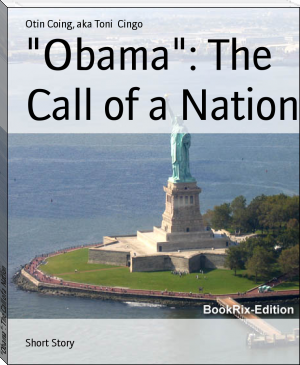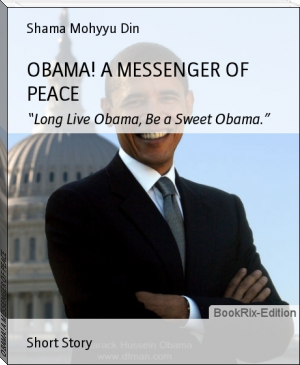"Obama": The Call of a Nation, Otin Coing, aka Toni Cingo [smart books to read TXT] 📗

- Author: Otin Coing, aka Toni Cingo
Book online «"Obama": The Call of a Nation, Otin Coing, aka Toni Cingo [smart books to read TXT] 📗». Author Otin Coing, aka Toni Cingo
From his slate cubicle inside a stainless steel skyscraper, Robert could not see the surrounding Manhattan skyline, but he could feel her weight that day. Fast-talking and occasionally foul-mouthed, Robert adored the city that had cradled him since birth, and he viewed his job—as exhausting as it could be at times—as one of its blessed traditions. On this particular day, his phone had been ringing non-stop since the market first opened that morning. Robert was not surprised when he received Donna’s message, for he had been trading pharma stock all day, and he would have advised her to do the same. There was something special about that day, and Robert waited for the President’s speech with great trepidation. While he felt that the sick should not suffer, he also believed that any policy that would raise taxes would send the nation into a deep depression. Making just over $100,000 per year, Robert himself was in the highest tax bracket, but after state, federal, and local taxes, he only had approximately half of his wages in a city with one of the highest costs of living in the country. Nobody had ever given him any breaks when he was a little punk growing up in Brooklyn, and that was before Brooklyn began its gentrification. He had supported himself through school, he worked harder than all of his colleagues, and he could not stand the thought of the fruits of his labors going toward funding healthcare for those who were too lazy to put in their fair share. Robert was on the phone with his man on the floor when the press conference started. “Hold on, Hank”, he said, “Oh-Bummer is about to give another speech”, smiling with smug satisfaction upon hearing the sardonic cackle coming from the other line, the anticipated accolade for his recycled wit.
Walking just a few blocks away from Robert’s building was David, who was returning from a weekend of hedonism in Montreal with a few of his classmates. Along the way, he had stopped by a Canadian pharmacy to pick up some topical ointments for his mother’s psoriasis, since they cost one-sixth of what they did in the US, despite being manufactured and packaged by the same company and at the same site. David was on his way to deliver the medications to his mother when his route was blocked by pedestrian gridlock. People seemed to be congregating at Times Square, and like a typical New Yorker, David decided to follow and see what all the commotion was about. He observed the wide-eyed and open-mouthed throngs of spectators staring at something on the screens above, so he did the same and looked up. “Obama, eh?” he asked himself while shaking his head in amusement at how quickly he picked up the Québécois colloquialism. David did not know what to make of the healthcare issue; he still possessed Youth’s illusion of immortality, as well as the comfort of knowing that Canada was just a few hours away.
Those around David were chanting the same name in different ways and with different intonations, as were individuals in different states, cities, and towns across the country. Some said it with faith, others with hope, others with skepticism, others with dread, and still others with ambivalence. A cacophony of voices expressing a myriad of opinions as diverse as their sources. An estimated one million people marched before the Capitol on September 12th in protest of the President’s healthcare plan. Had he heard them? The crippled and chronically ill were greater in number but lacked the physical capacity to march. Had he heard them?
Pacing back and forth while Secret Service gave the green light to step out, President Obama couldn’t help but feel a bit anxious about the speech he was about to deliver. He had solicited feedback from key opinion leaders representing all sides of the healthcare debate, and was about to propose a new plan that he felt was the best course of action for the country. There was a sense of biological frailty about him at that moment—his lips were parched, his body had a gnawing hunger for a cigarette, and his stomach felt queasy, either from that morning’s breakfast or because he knew that many would not be happy with his message. More importantly, he had been plagued by a severe case of insomnia throughout the preceding week, the onset of which was triggered by an unrelenting low-frequency buzzing sound in his ears.
Obama awakened from his pensive reverie once the signal was given. He centered himself, and proceeded to walk toward the podium with an elegance befitting a President. The boisterous room fell into a hushed silence immediately, and even the photographers stopped clicking away pictures. Once at the podium, he poised himself and opened his mouth so as to begin his speech, but then paused for a second upon realizing that the buzzing sound that had been tormenting him for days had suddenly disappeared…and then he grasped its significance.
The nation was listening.
THE END
Publication Date: 11-05-2009
All Rights Reserved





Comments (0)